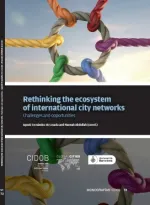Networks of cities or networked cities? Eight theses

The growing recognition that the 21st century will be the century of cities reflects something evident: today’s major challenges and global issues ultimately play out at the local level, which is also the main generator of solutions and responses. However, the important work city networks have done over the past few decades has also greatly contributed to this recognition. The success of this work has produced a self-applauding political discourse at both local and state levels around the world.
Further, it is reflected in the emergence of new and powerful city networks boosted by North American philanthropists, which are generally reluctant to move away from spaces with real leveraging power. At the same time, however, it leaves local governments with a difficult inheritance. They have been elevated to the category of leading actors without being suitably recompensed in the form of increased competences and resources, and without being offered new models of more plural and inclusive governance that allow them to live up to this greater responsibility.